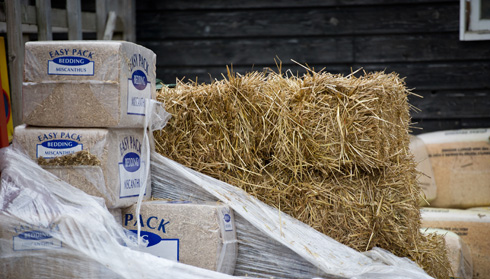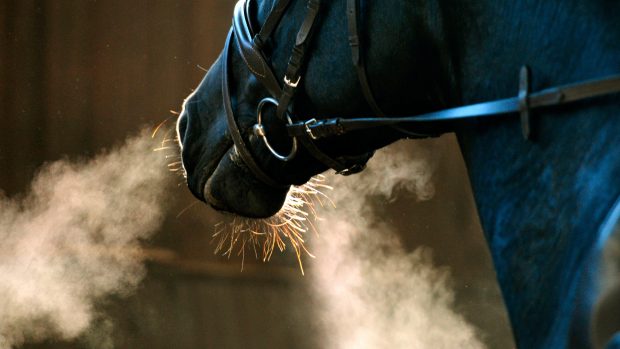While a cough can occur at any time of year, it is not unusual for some horses to develop a cough during winter. While it can be triggered by a virus or, more rarely, a bacterial infection, if a horse only develops an irritating cough when he is spending more time in his stable, and otherwise appears happy and healthy, the cause is more likely to be an allergy to contaminants in the air, such as dust and spores.
Why do horses cough?
The horse’s airway is made up of the upper respiratory tract (URT) – the nasal passages, larynx and trachea – and the lower respiratory tract (LRT) – the lungs and the small airways (bronchi and bronchioles).
The horse’s respiratory tract overcomes contaminants in the air in two ways:
- The mucociliary escalator – specialised cells that line the airway and filter the air before it reaches the lungs
- Cellular immunity – specialised lung cells that kill bacteria and inactivate viruses
Excessive cold or dusty air, ammonia and stress can all reduce the effectiveness of these defence mechanisms, increasing the horse’s susceptibility to respiratory problems, which can result in the horse coughing.
When should I worry about my horse’s cough?
If a horse develops a cough, it is wise to isolate them until you know they are not carrying an infection. Take the horse’s temperature, monitor their general health, and speak to your vet. A vet may decide to carry out some of the following investigations to diagnose if the cough is infectious:
- A full clinical examination, including listening to the lungs with a stethoscope
- An endoscopic examination of the upper respiratory tract
- Blood tests
- Swabs from the back of the throat to test for viruses
- Taking samples of discharge to establish the presence of bacteria or inflammatory cells
Can I ride my horse while it has a cough?
It is recommended that you rest a horse that has a cough, although it should have access to plenty of fresh air. Turnout is generally recommended. There is a traditional horseman’s saying that a horse should be rested for two days for every day they are coughing. Once this period has passed, exercise can be gradually reintroduced – light exercise can help the horse to clear any remaining mucus from its airways.
How will a vet treat a horse’s cough?
In many cases, rest and good horse husbandry (see advice below) are all that is necessary. If the vet feels medication is appropriate, this may include mucolytics to help loosen the discharge, allowing for easier drainage, and broncodilators to increase the airway diameter and reduce muscle spasm. Anti-inflammatories can be used to help to reduce soreness and enhance the effects of other drugs; inhaled preparations are also successful in some cases. Where bacteria are involved, antibiotics may be prescribed.
How to avoid a winter cough in horses
Roger Lee MRCVS offers some helpful advice on management techniques that can help avoid a winter cough in horses.
1. 24/7 turnout
One easy way to cure the problem of winter coughing is to leave your horse outside 24/7. With a waterproof rug, field shelter and plenty of feed, even horses in full work can winter outside very well, if the ground is suitable. However, if leaving your horse out is impractical, the next best way to tackle equine asthma is to improve air quality.
2. Use dust-free bedding
Bed your horse on dust-free shavings, paper or another low-dust alternative to straw. Consider where your horse’s stabled – there is no point having one horse on shavings and soaked hay if every other horse around it is on straw, or if the yard’s hay/straw barn is right outside its stable.
3. Feeding regimes to reduce dust
Feed dampened hay or haylage; forage is the single biggest source of dust and spores in the stable. Feed forage from the floor as this creates four times less inhaled dust than a hay net. Hay steamers are very good at eliminating dust and spores if you wish to feed hay.
4. Maintain a clean bed
Ammonia from urine-soaked bedding is irritant to the lungs. Keep the bed clean and dig out wet patches daily. If you are using rubber mats, make sure that there is plenty of bedding on top of them, and that urine is not building up underneath. Also do not muck out your horse’s stable or sweep while they are inside – take the horse outside while doing these tasks.
5. Improve air circulation
Simply having the top stable door open is not sufficient — there needs to be a through movement of air, so open wide any windows at the back. If there isn’t a window, see if you can safely remove some boards to create one. If you are worried about draughts, put an extra rug on your horse. If your horse is in a barn, give him a stable near the entrance where the air quality is best. A simple test of air quality is to stand at the back of the stable and take several deep breaths. If the air smells stale and dusty, it is not going to be good for your horse’s lungs.
You might also be interested in:
Make sure you’re aware of these five weather-releated problems so you can help keep your horse happy and healthy this

Equine asthma (also known as IAD/RAO/COPD/heaves): how to help your horse

Choosing the right bedding for you and your horse

5 weather-related skin conditions to watch out for with your horse

6 common hoof problems to keep an eye out for

Subscribe to Horse & Hound magazine today – and enjoy unlimited website access all year round
Horse & Hound magazine, out every Thursday, is packed with all the latest news and reports, as well as interviews, specials, nostalgia, vet and training advice. Find how you can enjoy the magazine delivered to your door every week, plus options to upgrade your subscription to access our online service that brings you breaking news and reports as well as other benefits.



